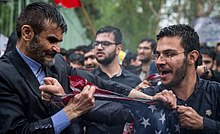
Ayatollah Ruhollah Khomeini was an Iranian political and religious leader who served as the first supreme leader of Iran from 1979 until his death in 1989. He was the founder of the Islamic Republic of Iran and the leader of the 1979 Iranian Revolution, which saw the overthrow of Shah Mohammad Reza Pahlavi and the end of the Persian monarchy. Following the revolution, Khomeini became the country's first supreme leader, a position created in the constitution of the Islamic Republic as the highest-ranking political and religious authority of the nation, which he held until his death. Most of his period in power was taken up by the Iran–Iraq War of 1980–1988. He was succeeded by Ali Khamenei on 4 June 1989.

The Iran hostage crisis was a diplomatic standoff between the United States and Iran. Fifty-two American diplomats and citizens were held hostage after a group of militarized Iranian college students belonging to the Muslim Student Followers of the Imam's Line, who supported the Iranian Revolution, took over the U.S. Embassy in Tehran and took them as hostages. The hostages were held for 444 days, from November 4, 1979 to their release on January 20, 1981.
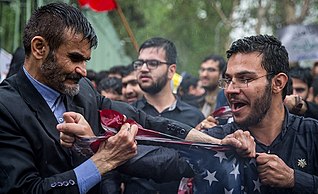
Anti-Americanism is opposition to, prejudice against, fear of, or hatred for the United States, its government, its foreign policy, or Americans in general.
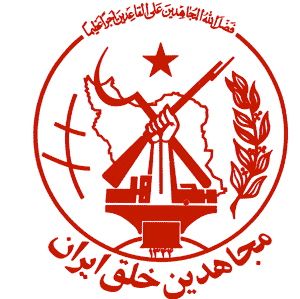
The People's Mojahedin Organization of Iran (PMOI), also known as Mojahedin-e-Khalq (MEK) or Mojahedin-e-Khalq Organization (MKO) (Persian: سازمان مجاهدين خلق ايران, romanized: sâzmân-e mojâhedīn-e khalq-e īrân), is an Iranian militant organization that advocates the overthrow of the Government of the Islamic Republic of Iran and installation of its own government. They accepted a combination of Marxism and Islamism as the base of their belief.

The Iranian Revolution, or the Islamic Revolution, refers to a series of events that culminated in the overthrow of the Pahlavi dynasty in 1979. It led to the replacement of the Imperial State of Iran by the present-day Islamic Republic of Iran, as the Moderate Muslim government of Mohammed Reza Pahlavi was superseded by the theocratic government of Ruhollah Khomeini, a religious cleric who had headed one of the rebel factions. The ouster of Pahlavi, the last Shah of Iran, formally marked the end of Iran's historical monarchy.

Grand Ayatollah Hussein-Ali Montazeri was an Iranian Shia Islamic theologian, Islamic democracy advocate, writer and human rights activist. He was one of the leaders of the Iranian Revolution and one of the highest-ranking authorities in Shīʿite Islam. He was once the designated successor to the revolution's Supreme Leader, Ayatollah Khomeini, but they had a falling-out in 1989 over government policies that Montazeri claimed infringed on people's freedom and denied them their rights, especially after the 1988 mass execution of political prisoners. Montazeri spent his later years in Qom and remained politically influential in Iran, but was placed in house arrest in 1997 for questioning "the unaccountable rule exercised by the supreme leader", Ali Khamenei, who succeeded Khomeini in his stead. He was known as the most knowledgeable senior Islamic scholar in Iran and a grand marja of Shia Islam. Ayatollah Montazeri was said to be one of Khamenei's teachers.

The 1953 Iranian coup d'état, known in Iran as the 28 Mordad coup d'état, was the U.S.- and UK-instigated, Iranian army-led overthrow of the democratically elected Prime Minister Mohammad Mosaddegh in favor of strengthening the monarchical rule of the shah, Mohammad Reza Pahlavi, on 19 August 1953. It was aided by the United States and the United Kingdom. The clergy also played a considerable role.

The Great Satan is a demonizing epithet for the United States of America in Iranian foreign policy statements. Occasionally, these words have also been used toward the government of the United Kingdom.
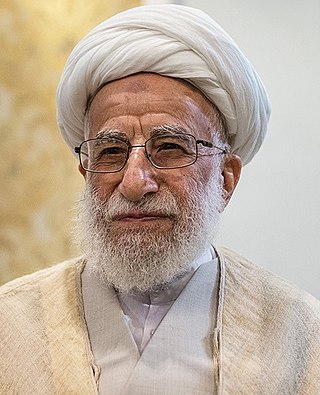
Ahmad Jannati is an Iranian conservative politician. He was born in Ladan, Isfahan. Jannati is known for his anti-LGBT rhetoric and opposition to secularism. He is also a founding member of the Haghani, school of thought.

Death to America is an anti-American political slogan. It is used in Iran, Afghanistan, Lebanon, Yemen, Iraq, and Pakistan. It has been used in Iran since the inception of the Iranian Revolution in 1979. Ruhollah Khomeini, the first Supreme Leader of the Islamic Republic of Iran, popularized the term. He opposed the chant for radio and television, but not for protests and other occasions.
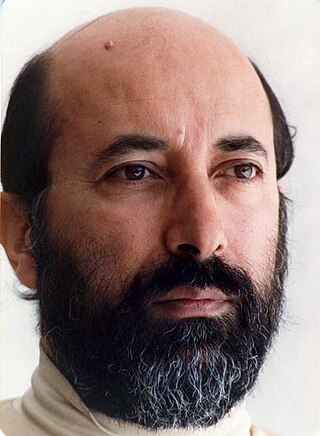
Mostafa Chamran Save'ei was an Iranian physicist, politician, commander and guerrilla fighter who served as the first defense minister of post-revolutionary Iran and a member of parliament as well as the commander of paramilitary volunteers in Iran–Iraq War, known as "Irregular Warfare Headquarters". He was killed during the Iran–Iraq War. In Iran, he is known as a martyr and a symbol of an ideological and revolutionary Muslim who left academic careers and prestigious positions as a scientist and professor in the US, University of California, Berkeley and migrated in order to help the Islamic movements in Palestine, Lebanon, Egypt as a chief revolutionary guerilla, as well as in the Islamic revolution of Iran. He helped to found the Amal Movement in southern Lebanon.

Relations between the Grand Duchy of Moscow and the Persian Empire (Iran) officially commenced in 1521, with the Safavids in power. Past and present contact between Russia and Iran have long been complicatedly multi-faceted; often wavering between collaboration and rivalry. The two nations have a long history of geographic, economic, and socio-political interaction. Mutual relations have often been turbulent, and dormant at other times.

Khomeinism refers to the religious and political ideas of the leader of the Islamic Revolution, Ruhollah Khomeini. Khomeinism may also refer to the ideology of the clerical class which has ruled Iran since 1979. It can also be used to refer to the radicalization of segments of the Twelver Shia populations of Iran, Iraq, and Lebanon, and the Iranian government's recruitment of Shia minorities in Afghanistan, Pakistan, Saudi Arabia and Africa. The word Khomeinist and Khomeinists, derived from Khomeinism, are also used to describe members of Iran's clerical rulers and differentiate them from regular Shia Muslim clerics.
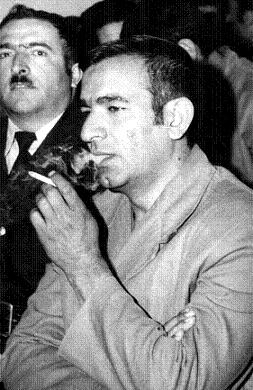
Mehdi Hashemi was an Iranian Shi'a cleric who after the 1979 Iranian Revolution became a senior official in the Islamic Revolutionary Guards. He was defrocked by the Special Clerical Court and executed by the Islamic Republic in September 1987. Officially he was guilty of sedition, murder, and related charges, but others suspect his true crime was opposition to the regime's secret dealings with the United States.
Following the overthrow of the Shah of Iran and his regime by revolutionaries in February 1979, Iran was in a "revolutionary crisis mode" from this time until 1982 or 1983 when forces loyal to the revolution's leader, Ayatollah Ruhollah Khomeini, consolidated power. During this period, Iran's economy and the apparatus of government collapsed; its military and security forces were in disarray.

Anti-Sunnism is hatred of, prejudice against, discrimination against, persecution of, and violence against Sunni Muslims.

Little Satan is an anti-Zionist derogatory epithet used especially by Iranian leaders for Israel.

"Island of Stability" is a phrase that became the namesake for a 1977 speech by American president Jimmy Carter, while he was being hosted by Mohammad Reza Pahlavi at the Niavaran Complex in the city of Tehran, Iran. It was a reflection of Iran's circumstances — regarded as a stable country and a bastion of the Western Bloc in what was otherwise an unstable Middle East under the influence of the Eastern Bloc — and the importance placed on Pahlavi's rule by the United States. Carter's speech was made one year before the Islamic Revolution, in which Pahlavi's monarchical state was overthrown and replaced by the Islamic Republic.
Global arrogance is a term used colloquially to describe the cultural and economic hegemony of the United States over other countries. It differs from the concept of imperialism, in which one country physically occupies another.
